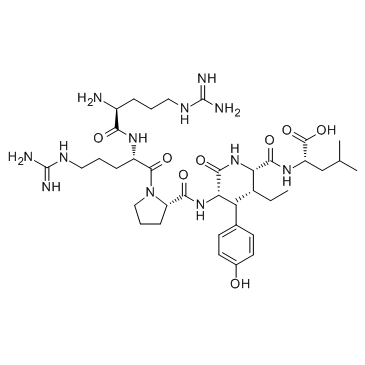The neurotensin fragment AcNT(8-13) inhibits lowering of interstitial fluid pressure in rat trachea.
Eli-Anne B Gjerde, Edward T Wei, Rolf K Reed
Index: Am. J. Physiol. Heart Circ. Physiol. 283(3) , H933-40, (2002)
Full Text: HTML
Abstract
Injury to soft tissue results in the lowering of interstitial fluid pressure (P(if)), plasma protein extravasation, and increased total tissue volume. In this study, the effects of N-acetyl neurotensin(8-13) [AcNT(8-13)] on P(if) in rat trachea were examined after electrical stimulation (ES) of the vagus nerve. P(if) was measured with glass capillaries connected to a servocontrolled counterpressure system. In pentobarbital-anesthetized female Wistar rats, the P(if) after intravenous saline was -1.8 +/- 0.3 mmHg (means +/- SD) and decreased to -5.0 +/- 0.6 mmHg (P < 0.01, n = 9) after ES. AcNT(8-13) (10 microg/kg) blocked the fall in P(if) after ES (-2.5 +/- 2.3 mmHg, P < 0.01, n = 8). In tracheal tissue from animals pretreated with AcNT(8-13) at the same dose and immersed in phosphate-buffered saline (0.15 M, pH 7.4), the rate of fluid accumulation in excised tissues was significantly reduced after 2 h. The ability of AcNT(8-13) to modulate the fluid mechanics of tracheal interstitium after inflammation suggests that it may be a useful tool for studying cell adhesion and related factors that maintain structural integrity of connective tissue after injury.
Related Compounds
| Structure | Name/CAS No. | Molecular Formula | Articles |
|---|---|---|---|
 |
Neurotensin (8-13) acetate salt
CAS:60482-95-3 |
C38H64N12O8 |
|
In vivo behavioral effects of stable, receptor-selective neu...
2005-03-01 [Neuropharmacology 48(3) , 417-25, (2005)] |
|
Radiolabeling of multimeric neurotensin(8-13) analogs with t...
2007-07-01 [Appl. Radiat. Isot. 65(7) , 818-26, (2007)] |
|
Gq/11-induced and spontaneous waves of coordinated network a...
2005-02-16 [J. Neurosci. 25(7) , 1737-49, (2005)] |
|
Radionuclide imaging of small-cell lung cancer (SCLC) using ...
2006-05-01 [Nucl. Med. Biol. 33(4) , 505-12, (2006)] |
|
Separation and determination of peptide hormones by capillar...
2008-09-15 [Anal. Biochem. 380(2) , 297-302, (2008)] |